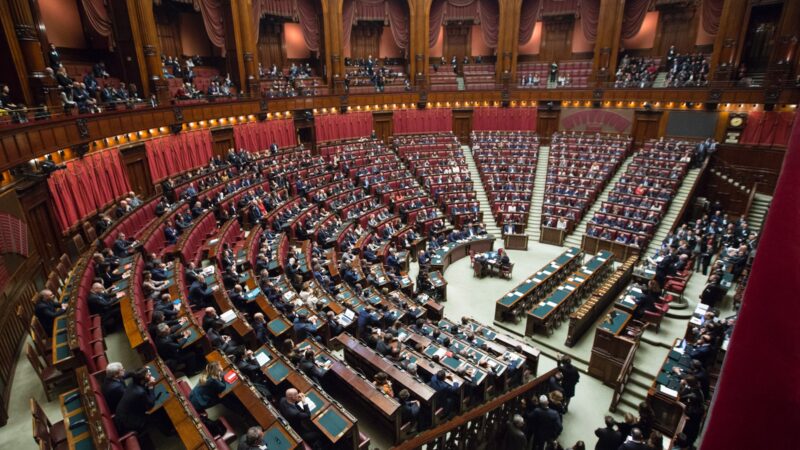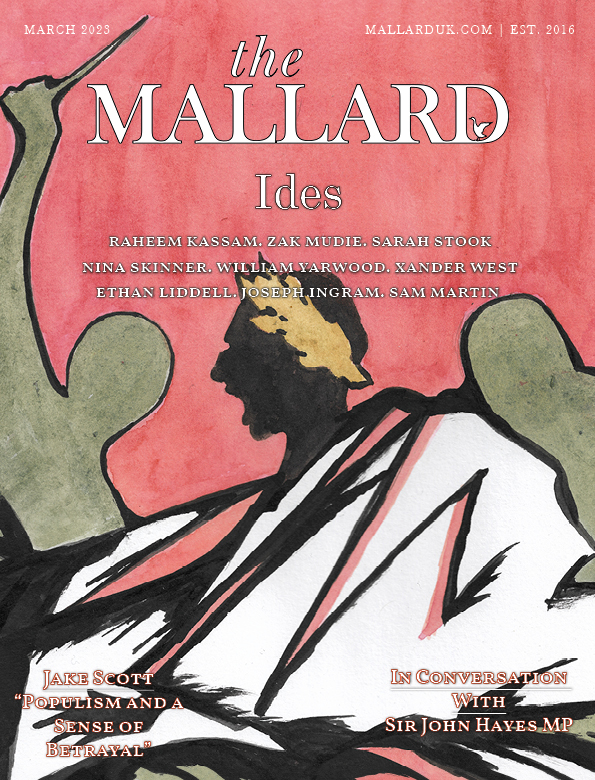I think it’s safe to assume, second only to the United States, Britain has the largest ‘free speech network’ in the Anglosphere. Comprised of any array of pressure groups, organisations, commentators, broadcasters, forums, publications, and self-appointed champions and activists.
Despite this well-funded and high-profile network of talking-heads, very few have spoken out in defence of Sam Melia, Yorkshire organiser for Patriotic Alternative, an organisation described by The Times as “Britain’s largest far-right white supremacist movement”. Gee, I wonder why?
Of course, there have been a few condemnations of this ruling, although they have been written on the assumption that Melia’s points are just mindless bigotry, and that such vulgarity would be better combatted in an open forum. It’s assumed that even the general thrust of Melia’s angst isn’t up for serious discussion, or vaguely reflected by large sections of the public. In other words, it is (somehow) not legitimately political, even if one believes it to be wrong, for whatever reason.
For context, last month, Leeds Crown Court returned a unanimous verdict after less than a day of deliberating after an eight-day trial. Sentencing has been adjourned whilst a pre-sentence report is being prepared and Melia been granted bail until he appears in court again on March 1st.
In April 2021, police uncovered a catalogue of downloadable stickers which were being distributed a group known as the Hundred Handers, an anonymous group of anti-immigration activists led by Melia, responsible for series of so-called “stickering incidents” between 2019 and 2021.
The court concluded that the stickers were “intended to stir up racial hatred” and “intentionally encouraging or assisting racially aggravated criminal damage”, further declaring that the stickering had “caused fear or alarm” – a delightfully vague and flexible justification.
Moreover, the argument that knowingly supplying material with the mere potentiality of being used in one of a multitude of ways constitutes “criminal damage” isn’t just contrived, it necessarily extends beyond fascist activism, applying to every political cause under the sun.
So, what did these stickers say? What made them so egregious that it was worth the court’s time? Well, one of them read “Labour loves Muslim rape gangs” – a slightly misleading statement, given that the Tories are a soft-touch too.
Don’t just take my word for it. Following the acid attack by Abdul Ezedi, a known sex offender who was granted asylum on his third attempt after claiming he had converted to Christianity, Gillian Keegan, Education secretary and Conservative MP said:
“This is not really about asylum, this is about the attack on a mother and her children, which was horrific.”
Bell Ribeiro-Addy, Labour MP for Streatham, the constituency where the attack took place, echoed Keegan’s comments on Ezedi’s asylum status and the all-encompassing ‘importance’ of microaggressions stating:
“His [Ezedi] asylum status is not really the issue of concern.”
Indeed, the attack was horrific, but it’s abundantly clear that asylum is absolutely part of the equation, much more so than gender. Out of the 710 acid attacks in Britain last year, 339 of the victims were women whilst 317 were men. Erstwhile, had the Home Office not permitted Ezedi to enter the country, and for quite intuitive and grounded reasons, the attack simply would not have occurred.
Unlike Melia, an unremarkable member of the public based in Leeds, one of the UK’s largest cities, who was found and arrested near-instantaneously, Ezedi, a man with a half-melted face in London, one of the most surveilled city on the planet, has evaded arrest for an entire week.
Britain’s police are so befuddled at the whereabouts of that they’ve taken to handing out cash prizes to violent criminals and grovelling on live TV, asking Ezedi to turn himself over.
Much has been said about the police’s waning capability and/or interest in dealing with serious crime, notwithstanding the many coppers who I’m sure are frustrated by the incompetence of their managers, but very little has been said about the force’s bizarre theory of mind.
How is it possible that an institution which has “modernised” so much over recent decades, jampacking its personnel with psychiatrists, criminologists, therapists, and charity workers, simply not understand how criminals think? Either they’re bad at their job or they’re theories are bunk. I’m inclined to think it’s both, skewing towards the latter.
Another of Melia’s stickers read “We will be a minority in our homeland by 2066” – “we” referring to White British people, “2066” referring to the date calculated from research conducted by demographer David Coleman, then-Professor at Oxford University, into Britain’s changing demographics back in 2013.
Again, what exactly is the cause for concern here? Merely 10 years ago, Coleman’s findings were getting write-ups and openly discussed in ‘respectable’ centre-left outlets, such as Prospect Magazine, The Guardian, and The Independent. Throw in the BBC if you feel so inclined.
This information, conducted by a highly respected demographer, out-dated though it might be, especially given the recent spike in immigration and the ensuing population growth, hasn’t been treated as a fringe, esoteric, and/or conspiratorial for the vast majority of the time it has been public.
Yes, freedom of speech should apply to all; that includes alleged and actual fascists, Nazis, communists, socialists, anarchists, supremacists of all creeds and colours, and even Piers Morgan. If our political class were to ever come around to this, they’d understand the efforts of the state are best directed at dealing with people like Ezedi, rather than people like Melia.
After all, if it has become the official view of the state that one can only express approval for such findings – that or nothing at all – then this absolutely should concern civil libertarians, whatever their political colours, regardless of what The Times says about the ‘offending’ individual and/or organisation in question.
Other stickers distributed by Melia and the Hundred Handers said: “Mass immigration is white genocide” and “Second-generation? Third? Fourth? You have to go back”.
This is where things get a little more controversial, although it stands to reason that freedom of speech isn’t valued (r feared) for its capacity to regurgitate uncontroversial points of view. When people marched through the middle of London, opposing what they perceived as a genocide by the Israelis against the Palestinians, were there protests en-masse? Were there legal repercussions for chanting ethnonationalist slogans of a foreign nation, such as From the River to the Sea? Not really, quite the opposite.
Simply put, it cannot be right that one group seeking collective preservation is given the freedom to do so, with near absolute freedom in their methods, turning out in their hundreds of thousands, whilst another group seeking collective preservation, with very few members in their movement and no electoral representation or visible popular support, is denied basic freedom.
This is not to say the protests weren’t problematic in other ways. Indeed, the problem with said protests was less to do with their opposition to the Israeli government and more due to the nature of allegiance revealed by the bulk of attendees, especially the organisers (Hiz but-Tahrir, an international pan-Islamist organisation, view their constituency in global, post-national terms) and the overlapping demographic implications for the broader body politic (it stands to reason that using one nation as a conduit for another nation’s interests is far from democratic).
My view is elucidated rather well by Ronald Reagan, then-President of the Screen Actors Guild, testifying as a friendly witness before the House Un-American Activities Committee in October 1947:
“As a citizen, I would hesitate to see any political party outlawed on the basis of its political ideology. We have spent 170 years in this country on the basis that democracy is strong enough to stand up and fight against the inroads of any ideology. However, if it is proven that an organisation is an agent of a foreign power, or in any way not a legitimate political party – and I think the Government is capable of proving that – then that is another matter.”
Understandably, there are qualms as to whether either camp’s claim to genocide is technically accurate, although both would claim ongoing circumstances function in much the same way. This can be discussed in a frank and open matter without the throwing people in the slammer.
As for the deportation stickers, once one accepts the likes of Melia on their own aforementioned terms – or, at the very least, is aware of the social implications of demographic change (i.e. social unrest) – one realises that a serious point is trying to be made, even if with an obvious hint of provocation.
Right now, the police are suggesting Ezedi is being helped by those in his community. More than the unsubtitled announcement of this revelation, sidelining the otherwise English-speaking population from their own domestic affairs, this shows a severe, multi-generational, and absolute lack of assimilation. You can moralise about the efficacy of deportations all you want, but we needn’t pretend that growing foreign contingencies inside our borders hasn’t created major problems.
In addition to naughty stickers, police also found a poster of Adolf Hitler on his wall and a book by Oswald Mosley at Melia’s home. For some reason, this is important. I’ve got books by and about Vladimir Lenin, Antonio Gramsci, Joseph Stalin, Chantal Mouffe, Karl Marx, Alain Badiou, and Giorgio Agamben and I’m not a radical leftist, or any kind of leftist for that matter.
Of course, given the stickers and his choice of paraphernalia, we can safely assume Melia is pretty right-wing. Then again, why should that matter? It is more than possible to have extreme views without being a threat to civilised society, just as one can hold moderate views to such a fanatic and unwavering extent that deviations from the illustrious ‘centre’.
In the case of the latter, the persecution of such people is seen as a necessary precaution to protect their modus operandi – typically, “liberal values” or “liberal democracy” – much in the same way many ‘extremists’ view persecution of dissidents as a necessary precaution for protecting their own modus operandi: the revolution, the state, the proletariat, the volk, and so on.
Indeed, views in and of themselves are basically harmless, although much of our political system evidently disagrees. In a similar vein to Keegan and Ribeiro-Addy, Conservative MP and Chair of the Women and Equalities Committee (yes, really) Caroline Noakes’ reaction to the Ezedi case centred around microaggressions – that is, words and mannerism whichcould hypothetically be interpreted as or lead to actions which are harmful:
“I think there’s a really important message here which is, with respect, the media are not interested in microaggressions, they want to hear about the most egregious offences.
“The stark reality is every day women will face misogyny and microaggressions. If you’re a woman of colour it will be worse, and we have to be better at understanding the culture that makes men think ‘that’s ok’. It’s not OK and you can see a pattern of behaviours that lead to really horrific crimes.”
The inverse and counter-intuitive approach our politicians and judicial system take towards words and actions is so confounding it form the basis of a derivative dystopia novel. Alas, it is the quite logical conclusion of our liberal-democratic political system, in which swathes of policy are depoliticised by filtering them the language of rights.
In Metapolitics, Badiou describes the role of political philosophy in reducing politics from a process of transformation defined by enmity to a passive exchange (a battle, some might say) of ideas:
“The central operation of political philosophy thus conceived is… first and foremost, to restore politics, not to the subjective reality of organized and militant processes… but to the exercise of ‘free judgement in a public space where, ultimately, only opinions count.”
This is certainly true, although it is quite clear that politics has deteriorated past this point, for the articulation of political philosophy itself is being drastically restricted. One is increasingly unpermitted to say or believe things happen or should happen for any other reason the one established by those in positions of officialdom.
Not only has the uniparty agreed that nothing can really be done about people like Ezedi coming into the country, absconding the idea something can be done to prevent people of his ilk from entering the country, they decreed the cause as if it were not up for debate: Andrew Tate saying women can’t drive is the problem, not the Human Right Act (1998).
Of course, Ezedi’s ability to game the asylum system via by the Human Rights Act (1998) was contingent on his claim of religious conversion, and the prospect of persecution should he return to Afghanistan, despite the fact he intended to return anyway.
Contrary to initial claims, Ezedi’s baptism was conducted by a Baptist priest. Sure, progressive Anglican priests have played an enabling role in other cases of a similar nature, such as the Liverpool Women’s Hospital bombing, and comprise an annoying large section of the CofE’s internal structure, but let’s try and get our Protestant denominations right before we point the finger. The willingness of many on the right to attack the CofE, just to swipe at the easily and rightfully detested Welby, was generally quite pathetic, especially considering ultimate responsibility lies with the Home Office.
In a time of liberal-left ideological hegemony, swelling with liberal universalism and race communism, you must ask yourself: do you have the populist gusto to berate the small handful of octogenarians who continue to read the Book of Common Prayer? Do you have the dissident bravery to attack what little semblance remains of Britain’s established Christian identity?
Indeed, basically every other religious organisation in Britain is ‘complicit’ in charitable efforts designed to help refuges and converts into the country, real or not, with the bulk of anti-deportation charities and activists having no religious motivation and affiliation at all. The Board of Deputies of Jews has continuously opposed efforts to make asylum laws more strict, whilst the Muslim Council of Britain advertises relief and aid advice no different to that contained in the CofE document making the rounds.
To any fair-minded opponent of liberal immigration policy, this should constitute an outrage. Alas, as Britain’s left-right becomes a proxy for the mutual animosity between Muslims and Jews, revitalised by the Israel-Palestine conflict, treating the established church as a conniving force is sure to become a new feature of our national common ground.
According to an eruditely conservative Anglican friend, the clergy doesn’t spend much time catechising with little-to-no effort being invested into understanding the catechumen before their baptism. In a similar fashion to the Home Office’s treatment of asylum applications, everything is done at a recklessly fast pace, with some newcomers being confirmed into the Church a couple of months after their supposed conversion.
Compared with more conservative parishes, in which the clergy spend well-over half-a-year getting to know their converts, it’s clear that one of the major problems facing the Church, moreso than accusations of whimsy naivete or malicious treason, and accompanying the already well-documented tendency of progressive Christians to reduce their theology to a grand metaphor, is the lack of zeal amongst much of its clergy. An unfashionable but necessary disposition, the pedantic conservatism of the Church has been sidelined in the pursuit of goal completely antithetical to the spirit of the Church itself: reflecting the society it wishes to elevate.
Unlike the aforementioned individuals and organisations in this article, who are guilty of prioritising words over deeds, the current Church’s fixation on deeds very much detracts from the words on which such endeavours are meant to be considered, shaped, and executed.
This hegemonic emphasis in the Church on being a do-gooder, on doing charity for the sake of charity, showing little-to-no consideration for textual analysis or well-rounded practical considerations, lest one wishes their faith to be pigeonholed as mere eccentricity or stuffy reactionaryism, runs deep into the “Quakerification” of the Church of England and post-war Britain generally. The extent to which Quakers are so charity-oriented is reflected by their small handful of members, the most “pious” of whom are on the fence as to whether they even believe in the essentials of Christianity or not.
This is an unsurprising development when one considers the Quaker roots of the organisations integral to the maintenance of the status quo, forces to which the progressive elements of the Church have allied themselves: Joseph Rowntree Foundation, Barrow Cadbury Trust, Paul Hamlyn Foundation, The Lloyd’s Foundation, The Barclay Foundation, and so on. The next time some midwit reformer wonk tells you religion doesn’t matter in the nitty-gritty of policy – least of all, in a post-religious Britain – hit them with “Blairism is secularised Quakerism” and watch them self-combust.
An avowed atheist, Clement Attlee, central architect of Britain’s post-war consensus, said of Christianity:
“I’m one of those people who are incapable of religious feeling… Believe in the ethics of Christianity. Can’t believe in the mumbo jumbo.”
Eventually, Attlee’s sentimentally Christian, but ultimately Atheistic, path to a “New Jerusalem” would be supplanted by Thatcher’s scrupulous and austere Methodism. Contrary to characterisations made by detractors and supporters, insisting Margaret’s Method was rooted in relishing the vulgarity and excess of yuppies, it was explicitly founded on the individualistic Pauline doctrine of the New Testament.
It would take Blair’s Quaker-ishness to bring the role of religion back into public life. John MacMurray, Tony Blair’s favourite philosopher (as described by Blair himself) became a Quaker near the end of his life, the culmination of his quasi-personalist philosophy, developed on the cusp of (although absolutely not opposed to) the development of modern liberalism. Thereafter, religion’s only permissible utility was its ability to make people feel less lonely in an atomised world, steering clear of anything beyond a shallow, practically non-existent, ultimately contemptuous consideration for scripture, symbol, or sacrament.
Should it be any surprise that the Blairite state allows pseudo-Christians into our country so easily?
Sure, a more critical approach to matters of faith would greatly benefit us in keeping foreign-born sex-offenders out of the country, but this runs against the current of a political obsession with words, not deeds. Nevertheless, if our system placed greater emphasis on Ezedi’s past deeds when processing his claim to asylum, and a little less on words slapped on a few dozen stickers, we’d be simultaneously safer and freer as a result.




